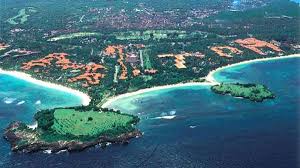Detik.com reports that Indonesia’s Minister of Tourism and the Creative Economy, Wishnutama Kusubandio, is finalizing standard operating procedures (SOP) and protocols to be applied across the national tourism industry under maxims for Cleanliness, Health, and Safety (CHS).

The world-renowned tourism enclave of Nusa Dua (ITDC) has been designated as a pilot project for the CHS program. The Ministry said ITDC was selected because of its central strategic location that is only a short drive from Bali’s Ngurah Rai International Airport and the ease the Complex provides for those monitoring program developments. Moreover, the ITDC is generously supported with accommodation, tourism amenities, and an internationally accredited hospital situated within the Complex.
The Ministry’s Deputy for Marketing, Nia Niscaya, said the Government remains committed to taking steps to mitigate the effects of COVID-19 on the national tourism economy. Explaining the plans for ITDC to serve as a pilot project for revitalizing national tourism, Nia said on Friday, 06 June 2020, “Before a tourism destination can be re-opened, a sense of faith and trust must first be established for visitors.”
The Ministry has broken down the re-opening of a tourism destination into two phases: Confidence Building and Creating Appeal.
The “Confidence” Building phase begins with preparing CHS protocols that can be packaged via tutorial video for use by hotels, restaurants, shopping centers, tourist attractions, and alike. This is followed by training, simulations, publications – all intended to champion the principles of Cleanliness, Health, and Safety (CHS).
In the second “Appealing” phase, the tourism ministry will operate several programs, including a “mega famtrip” for key opinion leaders (KOL), the media, and travel and tour operators.
Joint promotional programs creating tour packages created in cooperations with airlines and tour operators will also be launched during the “appealing” phase. Plans are also in hand to promote small scale MICE events.
Nia Niscaya was quick to note that the re-opening of a destination depends on the decisions of the National Task Force of the Mitigation of COVID-19 and the regional governments. Adding, “Each destination has its distinct situation and conditions that must be taken into account.”
Meanwhile, some 400 Indonesian tour and travel agents from the Association of Indonesian Tour and Travel Agencies (ASITA) have expressed readiness to make a success of the “new normal.”
Febrina Budiman, the chairperson of the ASEAN Section of ASITA-Bali, during a Webinar on Indonesian Tourism organized by the Ministry of Tourism on Friday, 05 June 2020, said: “We (the members of ASITA) are very optimistic that we can become ‘friends’ with COVID-19 or, in other words, we must learn to live with, at least for now, with the virus.”
This optimism among tourist and creative economy professionals in Bali is not without basis. Despite the closure of international gateways as a reaction to COVID-19, the cessation of flights from China in February 2020, followed by the Island’s closure to international travel in March 2020 – that in combination have effectively closed the local tourism industry – there remains rays of hope to be found.
Meanwhile, the Government of Bali’s success in coordinating the local community to limit the spread of COVID-19 has instilled confidence among Bali’s tourism industry that efforts to gradually re-open tourism activities will eventually prove successful.
Through Thursday, 04 June 2020, the official number of “positive” COVID-19 cases in Bali stood at 510, with 364 recorded as “cured” and five deaths. Budiman declared that the faster new cases of COVID-19 are handled, the fasters the Island’s economy will recover. “We are most thankful for the current condition and thank the regional government and the local community,” she said.
In cooperation with the Central and Provincial Government, ASITA-Bali has established protocols for cleanliness, health, and safety, which will be strictly enacted by all stakeholders in Bali’s tourism industry. These new protocols will begin even before tourists arrive in Bali and remain in force throughout a guest’s stay, starting from arrival at the airport, transfer to the hotel, during tours, and the return to the airport and the onward flight to their next destination. Cleanliness, health, and safety will color every part of a visit to Bali, providing peace of mind to tourists during the “new normal.”
“But when the destination (of Bali) will fully re-open to tourists remains the government’s decision,” Budiman added.






